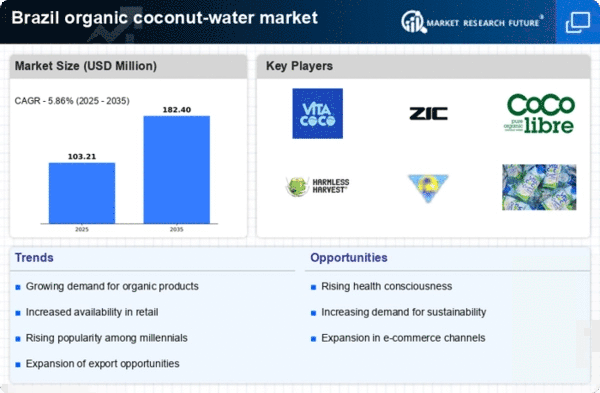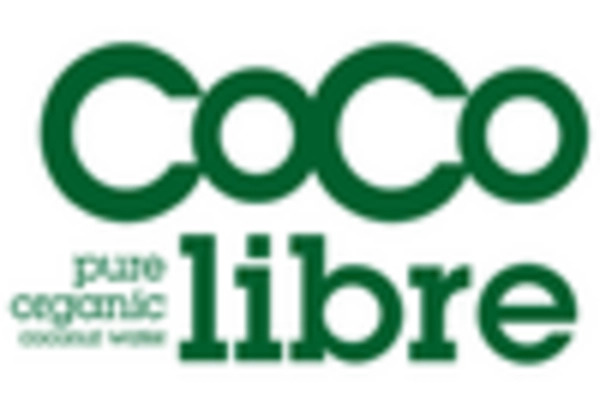Rising Health Awareness
The organic coconut-water market in Brazil is experiencing a surge in demand driven by increasing health awareness among consumers. As individuals become more conscious of their dietary choices, they are gravitating towards natural and organic beverages. This trend is reflected in the market, where organic coconut water is perceived as a healthier alternative to sugary drinks. According to recent data, the organic beverage sector in Brazil has seen a growth rate of approximately 15% annually, with coconut water being a significant contributor. The organic coconut-water market benefits from this shift, as consumers seek hydration options that are low in calories and rich in electrolytes. This heightened focus on health is likely to continue influencing purchasing decisions, thereby propelling the market forward.
Innovative Marketing Strategies
The organic coconut-water market in Brazil is witnessing a transformation due to innovative marketing strategies employed by brands. Companies are increasingly utilizing social media and influencer partnerships to promote the health benefits and versatility of organic coconut water. This approach appears to resonate well with younger consumers, who are more inclined to engage with brands that utilize modern marketing techniques. Data indicates that brands leveraging digital marketing have seen a 30% increase in sales within the organic coconut-water market. As these strategies continue to evolve, they are likely to attract a broader audience, thereby driving market growth. The emphasis on storytelling and brand authenticity may further enhance consumer trust and loyalty.
Growing Trend of Plant-Based Diets
The organic coconut-water market in Brazil is positively influenced by the rising trend of plant-based diets. As more consumers adopt vegetarian and vegan lifestyles, the demand for plant-based beverages has surged. Organic coconut water, being a natural and plant-derived product, fits seamlessly into this dietary shift. Recent statistics suggest that the plant-based food market in Brazil is projected to grow by 25% over the next five years, with coconut water playing a pivotal role in this transformation. The organic coconut-water market stands to gain from this trend, as consumers seek nutritious and sustainable options that align with their dietary preferences. This alignment with plant-based diets may enhance brand loyalty and consumer engagement.
Cultural Preference for Natural Beverages
In Brazil, there exists a strong cultural preference for natural and refreshing beverages, which significantly impacts the organic coconut-water market. Coconut water has long been a staple in Brazilian culture, often consumed for its hydrating properties. This cultural affinity is reflected in the market dynamics, where organic coconut water is increasingly favored over synthetic alternatives. The organic coconut-water market is likely to thrive as consumers continue to embrace traditional beverages that align with their health-conscious lifestyles. Additionally, the integration of coconut water into local culinary practices further enhances its appeal, potentially leading to increased consumption rates. This cultural connection may serve as a catalyst for market expansion.
Increased Availability of Organic Products
The organic coconut-water market in Brazil is bolstered by the growing availability of organic products in retail outlets. Supermarkets and health food stores are increasingly dedicating shelf space to organic beverages, including coconut water. This trend is supported by data indicating that organic product sales in Brazil have risen by 20% over the past year. The organic coconut-water market is poised to benefit from this enhanced accessibility, as consumers are more likely to purchase products that are readily available. Furthermore, the expansion of e-commerce platforms has made it easier for consumers to access organic coconut water, thus broadening the market's reach. As more retailers recognize the demand for organic options, the market is expected to see sustained growth.
















